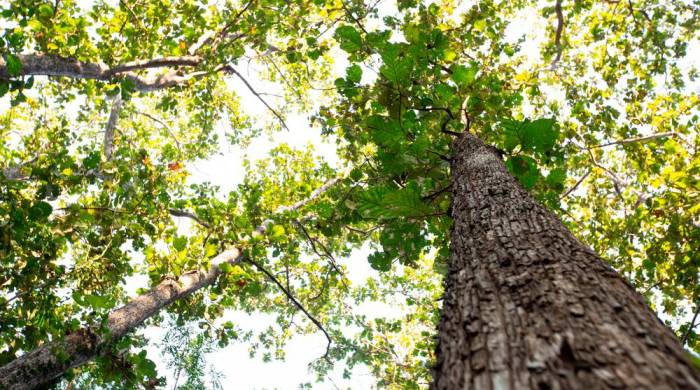Apex: Panama’s Annual Teak Exports Reach $30 Million
- June 25, 2024
- 9:45 am
Lourdes García Armuelles

In Panama, there are 80,000 hectares of commercial teak plantations, primarily located in Panama Este, Darién, and Chiriquí. Notably, 98% of the wood exported from Panama is teak.
Annually, teak wood exports from Panama reach a value of $30 million, with the placement of 7,000 to 10,000 forty-foot containers in the market, confirmed Bianca Morán, President of the Panamanian Exporters Association (Apex)
**According to Morán, exports in this sector have already reached $16 million in 2024.**
"‘In Panama, 98% of the wood that is exported is teak, a species that is not native to the country because all the teak that exists was planted,’ said the president of Apex at a meeting with journalists this Tuesday."
In the first four months of 2024, Panamanian exports totaled $283.3 million. Of this amount, raw teak exports accounted for 6.1%, according to data from the Ministry of Commerce and Industries."
In the country, there are 80,000 hectares of commercial teak plantations. Most of them are located in Panama East, Darién, and Chiriquí.
While teak export is one of the largest sectors in the country, the president of Apex clarified that it also suffers from fluctuations due to market demand. 'Teak is a commodity,' she said. commodityTeak, like copper and gold, is a commodity that depends on market demand. For example, this year Europe is experiencing an economic recession. However, during the COVID pandemic, we sold a lot because people were at home and wanted new furniture," Morán said.
We need to diversify and not rely on just one market. In this case, what has affected us is that India has a certain amount of wood it can definitely consume each year. We are focused on wanting to sell everything to India, but there are other countries that also produce wood, so we need to take advantage of the tools the market offers us," she added.
For the president of Apex, another disadvantage is that of all the large companies engaged in teak exports in the country, only three do so directly, while the rest rely on intermediaries.
In teak and in all sectors, using an intermediary means that they take a cut that should stay with the producer. That's what we need to expand: our direct export base," she emphasized.
Teak is a type of wood predominantly used for making outdoor furniture. Its high presence in Panama has made the country one of the largest certified producers in the region.
To continue leveraging these advantages, the Apex president called for promoting the arrival of more certified forestry investors.
“They comply with much higher voluntary standards than those required by Panama as a country, and that’s what allows people to live from the forest with dignity, with a model forest,” Morán noted.
Álvaro Castillo, from the Forest Directorate, Natural Heritage Section of the Ministry of Environment (MiAmbiente), emphasized that the forest contains a variety of woods and species. However, among those with the greatest prominence for export are all the hardwoods, such as balsam, almendro, amargo amargo, quira, and teak.
For the domestic market, the predominant woods are espavé, cedar, oak, fox, and yellow, which are known for their good sales and ease of processing for making doors, flooring, and other products.
Castillo acknowledged that over the years, companies have shown interest in selling roundwood or wood with a certain degree of processing.
To prevent illegal activities, Castillo revealed that MiAmbiente has established a digital forestry traceability system since 2018, which consists of two components. The first is the use of a chip to record all information about the tree, including its location, diameter, height, and species in the field. chip To input all the information about the tree, including its location, diameter, height, and species in the field.
Additionally, they use a tagtag, which consists of QR codes linked to the chip to track the traceability from the moment the wood is cut until it reaches the industry.
With these measures, according to the official, they have detected fewer seizures of illegal wood. For example, he explained that in recent years they have reported around 200 cubic meters of wood seized due to illegal activities, compared to previous figures that ranged from 1,000 to 1,800 cubic meters nationwide.
“We have indeed seen the statistics, and they are lower (seizures of illegal wood). Sometimes we seize 10 loads when it used to be 30 or 40,” Castillo commented.
Regarding the cocobolo tree species, Castillo said that MiAmbiente continues to detect illegal activities, primarily due to illegal logging in national parks such as Soberanía and Camino de Cruces.
“Illegal logging of cocobolo is now very rare. From 2014 to 2019, we confiscated a thousand cubic meters of this wood,” detailed the MiAmbiente official, who also noted that other areas have seen impacts on cedar, balsam, espavé, quira, and oak.
Castillo highlighted that illegal wood is no longer reaching the markets because, due to the operations conducted with public security entities, the material is being detected in transit.

About us
Panamá Teak is a registered trademark dedicated to the marketing and sale of forest products crafted from 100% FSC® certified tectona grandis teak, naturally grown and commercially cultivated in the Republic of Panama.
